跨文化交际重点梳理
《跨文化交际》主要内容梳理共28页文档

《跨文化交际》主要内 容梳理
6、纪律是自由的第一条件。——黑格 尔 7、纪律是集体的面貌,集体的声音, 集体的 动作, 集体的 表情, 集体的 信念。 ——马 卡连柯
8、我们现在必须完全保持党的纪律, 否则一 切都会 陷入污 泥中。 ——马 克思 9、学校没有纪律便如磨坊没有水。— —夸美 纽斯
10、一个人应该:活泼而守纪律,天 真而不 幼稚, 勇敢而 鲁莽, 倔强而 有原则 ,热情 而不冲 动,乐 观而不 盲目。 Байду номын сангаас—马 克思
谢谢
11、越是没有本领的就越加自命不凡。——邓拓 12、越是无能的人,越喜欢挑剔别人的错儿。——爱尔兰 13、知人者智,自知者明。胜人者有力,自胜者强。——老子 14、意志坚强的人能把世界放在手中像泥块一样任意揉捏。——歌德 15、最具挑战性的挑战莫过于提升自我。——迈克尔·F·斯特利
跨文化交际知识点汇总
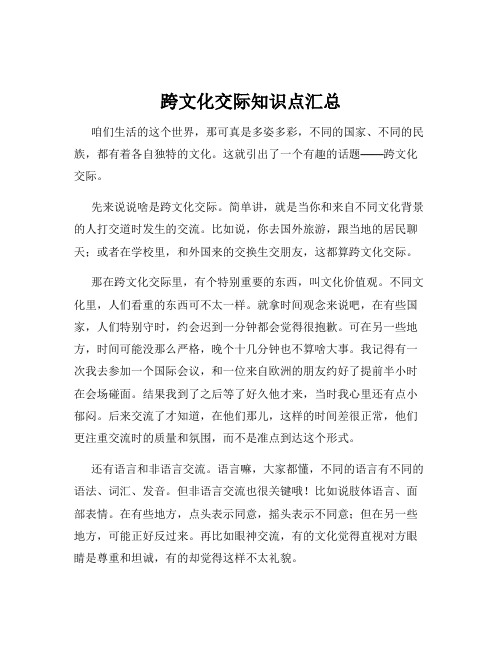
跨文化交际知识点汇总咱们生活的这个世界,那可真是多姿多彩,不同的国家、不同的民族,都有着各自独特的文化。
这就引出了一个有趣的话题——跨文化交际。
先来说说啥是跨文化交际。
简单讲,就是当你和来自不同文化背景的人打交道时发生的交流。
比如说,你去国外旅游,跟当地的居民聊天;或者在学校里,和外国来的交换生交朋友,这都算跨文化交际。
那在跨文化交际里,有个特别重要的东西,叫文化价值观。
不同文化里,人们看重的东西可不太一样。
就拿时间观念来说吧,在有些国家,人们特别守时,约会迟到一分钟都会觉得很抱歉。
可在另一些地方,时间可能没那么严格,晚个十几分钟也不算啥大事。
我记得有一次我去参加一个国际会议,和一位来自欧洲的朋友约好了提前半小时在会场碰面。
结果我到了之后等了好久他才来,当时我心里还有点小郁闷。
后来交流了才知道,在他们那儿,这样的时间差很正常,他们更注重交流时的质量和氛围,而不是准点到达这个形式。
还有语言和非语言交流。
语言嘛,大家都懂,不同的语言有不同的语法、词汇、发音。
但非语言交流也很关键哦!比如说肢体语言、面部表情。
在有些地方,点头表示同意,摇头表示不同意;但在另一些地方,可能正好反过来。
再比如眼神交流,有的文化觉得直视对方眼睛是尊重和坦诚,有的却觉得这样不太礼貌。
宗教信仰也是跨文化交际里得小心对待的部分。
世界上有各种各样的宗教,每个宗教都有自己的教义、仪式和禁忌。
要是不了解这些,一不小心可能就会冒犯到别人。
我有个朋友去一个宗教氛围浓厚的国家旅游,因为不了解当地宗教的禁忌,在寺庙里不小心做了不合适的举动,结果引起了当地人的不满。
风俗习惯的差异也很大。
就拿饮食来说,有的地方用筷子,有的用刀叉,还有的直接用手抓。
而且食物的种类、烹饪方式、用餐礼仪都各有讲究。
像在日本,吃拉面的时候发出吸溜吸溜的声音表示好吃,可在咱们这儿,可能就会被认为不太礼貌。
在跨文化交际中,文化冲击也是常有的事儿。
当你一下子进入一个完全陌生的文化环境,可能会感到困惑、不适应甚至焦虑。
跨文化交际 知识点总结
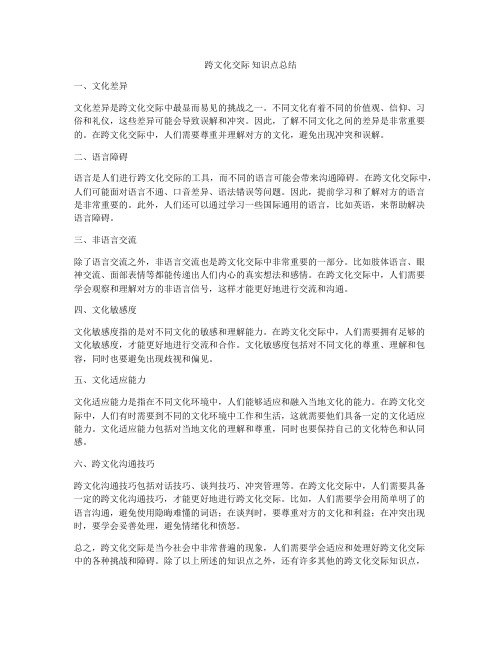
跨文化交际知识点总结一、文化差异文化差异是跨文化交际中最显而易见的挑战之一。
不同文化有着不同的价值观、信仰、习俗和礼仪,这些差异可能会导致误解和冲突。
因此,了解不同文化之间的差异是非常重要的。
在跨文化交际中,人们需要尊重并理解对方的文化,避免出现冲突和误解。
二、语言障碍语言是人们进行跨文化交际的工具,而不同的语言可能会带来沟通障碍。
在跨文化交际中,人们可能面对语言不通、口音差异、语法错误等问题。
因此,提前学习和了解对方的语言是非常重要的。
此外,人们还可以通过学习一些国际通用的语言,比如英语,来帮助解决语言障碍。
三、非语言交流除了语言交流之外,非语言交流也是跨文化交际中非常重要的一部分。
比如肢体语言、眼神交流、面部表情等都能传递出人们内心的真实想法和感情。
在跨文化交际中,人们需要学会观察和理解对方的非语言信号,这样才能更好地进行交流和沟通。
四、文化敏感度文化敏感度指的是对不同文化的敏感和理解能力。
在跨文化交际中,人们需要拥有足够的文化敏感度,才能更好地进行交流和合作。
文化敏感度包括对不同文化的尊重、理解和包容,同时也要避免出现歧视和偏见。
五、文化适应能力文化适应能力是指在不同文化环境中,人们能够适应和融入当地文化的能力。
在跨文化交际中,人们有时需要到不同的文化环境中工作和生活,这就需要他们具备一定的文化适应能力。
文化适应能力包括对当地文化的理解和尊重,同时也要保持自己的文化特色和认同感。
六、跨文化沟通技巧跨文化沟通技巧包括对话技巧、谈判技巧、冲突管理等。
在跨文化交际中,人们需要具备一定的跨文化沟通技巧,才能更好地进行跨文化交际。
比如,人们需要学会用简单明了的语言沟通,避免使用隐晦难懂的词语;在谈判时,要尊重对方的文化和利益;在冲突出现时,要学会妥善处理,避免情绪化和愤怒。
总之,跨文化交际是当今社会中非常普遍的现象,人们需要学会适应和处理好跨文化交际中的各种挑战和障碍。
除了以上所述的知识点之外,还有许多其他的跨文化交际知识点,比如文化适应、文化冲突解决等等。
跨文化交际重点梳理

重点1 Definition of cultureCulture is the total accumulation of beliefs, customs, values, institutions and munication patterns that are shared, learned and passed through the generations in an identifiable group of people.重点2 Characteristics of culture(10) 1、Culture is sharedCulture is a system of shared values beliefs or patterns of behaviors held in a group ,organization or society.It is not property of any individual.2、culture is cumulativeHuman beliefs, arts etc. are results of many generations.Every generations can discover the new things.The new knowledge are added to what was learned in previous generations.3、culture is learnedCulture is not inherent with any people.Culture can not be genetically and automatically passed down from previous generations.And it should be taught and learned by people.4、culture is adaptiveCulture is created by humans. Humans have to adapt the environment . thus is in development bears the trait of being adaptive5、culture is dynamicAt the same time that new culture are added, and the old ones are lost because they are no longer useful.6、culture is symbolicSymbols generally serve as municative tools for a multitude purposes, on a persons as well as culture level.7 、culture is relationalCulture is an organic whole. All the ponents of culture are interlinked.8 、culture is implicit and e*plicitSome layers culture are easy to be observe, like eating ,dressing, talking. But the ideas underlying the behaviors are generally hard to know. Many scholars label the culture as iceberg.9、 culture is universal10 、culture is diversified重点3 Hall,s dimensionsHigh conte*tHigh-conte*t munication relies heavily on nonverbal, conte*tual and shared cultural meanings.The meanings are not fully e*pressed.Meanings are determined by 〞 things are said , rather than 〞 is said.日本欧洲东部和南部阿拉伯CollectivismLow conte*tVerbal codes rather than the information impliesClear straight and to-the-point munication美国德国斯堪的纳维亚IndividualismMonochromic cultureDo one thing at one time, Concentrate on the job, take time seriously, low-conte*t and need information, mit to the job, religiously to the plans, not disturbing others, seldom borrow or lend things, emphasize promptnessPolychromic cultureDo many things at once, subject to interruptions, consider time mitments an objective to be achieved, high-conte*t and already have information. Change plans often. Emphasize the relationships.重点4 Triandis,s individualism & collectivismIndividualismFosters independence and individual achievement,Promotes self-e*pression ,personal choice, individual thinkingAssociated with egalitarian relationships and fle*ibility in rolesUnderstand the physical world as knowable apart of human lifeCollectivismInterdependence and group successPromotes adherence to normsAssociated with stable, hierarchical rolesShared property, group ownership重点5 Elements of municationSource (sender)EncodingMessageMedium(channel)ReceiverDecodingResponseFeedback重点6 Grice,s cooperative principle Quantity ma*imMake your contribute as informative as is required for the current purpose of e*change.Do not make your contribution more information than isrequired.〔量的准则——话语提供充分而不多余的信息〕Quality ma*imMake your contribution is ture〔质的准则——话语的容是真正的〕Relation ma*imBe relevant〔关系准则——话语与话题有关,即与所要实现的意图有关〕Manner ma*imBe perspicuousAvoid obscurity of e*pressionAvoid ambiguityDe brief and orderly(方式准则——说话要清晰明白、简洁而有条理)重点7 Brown & levinson’s face theoryFace is something that is emotionally invested, can be lost, maintained, or enhanced, and must be often attended to in municationPeople cooperate while maintaining face in interaction. Face theory : face threatening acts (FTAs)Politeness strategiesPoliteness 子威胁行为威胁行为strategies: bald on-record不使用补救措施赤裸裸的公开实行面off-record indirect strategy 非公开的实行面子negative politeness 消极礼貌策略Positive politeness 积极礼貌策略Face: negative facePositive face重点8 Thought patternsField dependence场依存性Holistic thinking eastern peoplePerspective of the whole, all the relevant parts take into account.Easily influence by othersField independence场独立性Analytic thinking western peopleDivinding the whole into parts to analyze the features or relations between the partsHardly influence by othersEastern: field-dependence, holistic thinking, high-conte*t Western: field-independence, analytic thinking, low-conte*t 重点9 Phases of negotiationPreparation 准备Non-task sounding 非任务测探Task-oriented e*changePersuasion 劝说ConcessionConclusion重点10 ponents of a brandBrand name 品牌名称〔产品〕Brand mark 品牌标志〔产品〕Trade name 商号〔公司名字〕Trade mark 品牌商标重点11 SWOT analysisStrengthsWeaknessesOpportunitiesThreats重点12 Intercultural advertising strategiesStandardization strategyConvey and e*tend the same advertising message to different markets and culturesKey point:Deal with the different markets using the same massageE*ample:MarlboroPhilips优点: reinforce the corporate imageSaving energyBe convenient to manage pared with several ads缺点: unlikely to be adaptive without change to all foreigncultureResult in misunderstanding or conflict even ruin a businessLocalization strategyStresses the specialties of the local market and adaptation to the local market environment重点13 Three meaning layers of adsthe surface meaningthe intended meaningthe cultural meaning。
跨文化交际知识点总结
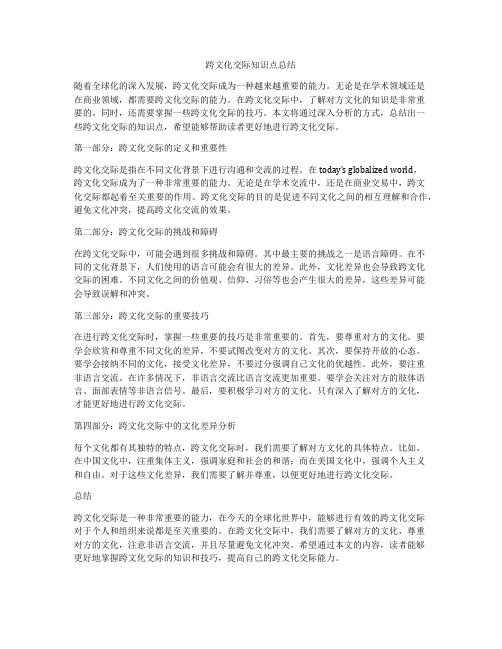
跨文化交际知识点总结随着全球化的深入发展,跨文化交际成为一种越来越重要的能力。
无论是在学术领域还是在商业领域,都需要跨文化交际的能力。
在跨文化交际中,了解对方文化的知识是非常重要的。
同时,还需要掌握一些跨文化交际的技巧。
本文将通过深入分析的方式,总结出一些跨文化交际的知识点,希望能够帮助读者更好地进行跨文化交际。
第一部分:跨文化交际的定义和重要性跨文化交际是指在不同文化背景下进行沟通和交流的过程。
在today’s globalized world,跨文化交际成为了一种非常重要的能力。
无论是在学术交流中,还是在商业交易中,跨文化交际都起着至关重要的作用。
跨文化交际的目的是促进不同文化之间的相互理解和合作,避免文化冲突,提高跨文化交流的效果。
第二部分:跨文化交际的挑战和障碍在跨文化交际中,可能会遇到很多挑战和障碍。
其中最主要的挑战之一是语言障碍。
在不同的文化背景下,人们使用的语言可能会有很大的差异。
此外,文化差异也会导致跨文化交际的困难。
不同文化之间的价值观、信仰、习俗等也会产生很大的差异,这些差异可能会导致误解和冲突。
第三部分:跨文化交际的重要技巧在进行跨文化交际时,掌握一些重要的技巧是非常重要的。
首先,要尊重对方的文化。
要学会欣赏和尊重不同文化的差异,不要试图改变对方的文化。
其次,要保持开放的心态。
要学会接纳不同的文化,接受文化差异,不要过分强调自己文化的优越性。
此外,要注重非语言交流。
在许多情况下,非语言交流比语言交流更加重要。
要学会关注对方的肢体语言、面部表情等非语言信号。
最后,要积极学习对方的文化。
只有深入了解对方的文化,才能更好地进行跨文化交际。
第四部分:跨文化交际中的文化差异分析每个文化都有其独特的特点,跨文化交际时,我们需要了解对方文化的具体特点。
比如,在中国文化中,注重集体主义,强调家庭和社会的和谐;而在美国文化中,强调个人主义和自由。
对于这些文化差异,我们需要了解并尊重,以便更好地进行跨文化交际。
跨文化交际的总结

跨文化课程重点总结第一课文化、交际、跨文化交际一、跨文化交际的重要性跨文化交际的机会是由全球化引起的交通和通讯系统的发展(缩短旅游时间,电视网络,互联网,国际电影业)国家间的文化迁移(多元文化主义)新经济领域(跨国公司)不断增长的世界人口(有限的自然资源、污染、国际冲突)二、文化是什么(一)文化的定义1、《简明牛津词典》:文化是“艺术和被集体视为人类智慧成就的其他表现形式”。
2、从人类学的角度定义文化:文化是“一个特定时代或民族的风俗、文明和成就”。
3、(霍尔,1983)我们将文化定义为“信仰、习俗、价值观、行为、制度和交流方式的总和,这些都是在一个可识别的群体中被共享、学习和代代相传的。
”4、1871年爱德华·泰勒爵士的定义(第一次使用这个术语):"这个复杂的整体包括知识,信仰,艺术,道德,法律,习俗以及人类作为社会成员所获得的其他能力和习惯"5、Kroeber and Kluckhohn (1952) 克罗伯和克拉克洪。
文化由显性和隐性的模式组成,是通过符号获得和传递的行为,构成了人类群体的独特成就,包括在人工制品中的体现;文化的本质核心是由传统的(即历史的派生和选择的)思想,尤其是它们所依附的价值观所组成的;文化系统一方面可以被认为是行动的产物,另一方面可以被认为是进一步行动的制约因素。
6、Porter & Samovar 波特和萨莫瓦尔“知识、经验、信仰、价值观、态度、意义、等级、宗教、时间观念、角色、空间关系、宇宙观念、物质对象和财产的积累,这些都是一群人通过个人和群体几代人的奋斗过程中获得的。
”—《跨文化交际读本》7、文化的内容“是文学、美术、音乐、哲学、科学这一类的事。
”-陈独秀8、“文化是生活的样法。
”“文化,就是吾人生活所依靠的一切。
”-梁漱溟9、“人类在社会历史发展过程中所创造的物质和精神财富的总和,特指精神财富,如文学、艺术、教育、科学等。
跨文化交际知识点总结

跨文化交际知识点总结随着全球化的深入,跨文化交际变得越来越重要。
跨文化交际是指在不同文化背景下进行的交流互动。
对于从事国际贸易、外语教育、海外学习等领域的人来说,掌握跨文化交际知识点是必不可少的。
在本文中,我们将总结一些跨文化交际的知识点,希望能够给您提供帮助。
一、文化差异文化是不同地域、不同族群、不同历史阶段人们的共同体验和思维方式的总和。
文化背景不同,人们的价值观、行为方式和传统习惯也会不同。
在跨文化交际中,文化差异是一个非常重要的问题,因为文化差异可能会导致沟通障碍、误解和冲突。
1、时间观念在不同的文化环境中,人们对时间的认知和运用都会有所不同。
在一些文化中,时间被视为一种固定的资源,应该被精确地利用。
比如说,美国文化中的时间就是金钱;而在中国文化中,时间常常被视为一种循环,它存在于人们之间的关系中,对于“准时”也有一些灵活的理解。
意大利、西班牙等南欧国家虽然有严谨的公共时间表,但在私人交往中强调情感和人际关系,在时间管理上相对宽松和弹性。
了解不同文化的时间概念,可以帮助我们更好地把握时间、精确地计划和实施任务,同时也能够避免因时间观念差异导致的误解和冲突。
2、礼仪习惯不同的文化中,人们对礼节和礼仪也会有所差异。
在日本、韩国等文化中,人们注重礼节和尊重他人,他们有很多规范和习惯需要遵守,比如在进屋时要脱鞋、在用餐时要用筷子等等。
在教堂、公共场所、重大活动等地区域中,西方文化中介绍穿着正式,男士要穿西服领带。
如果在跨文化交际中忽视和破坏这些礼仪和习惯,会引起对方的不满,降低你自己的形象和信誉度。
因此,尊重别人的文化习惯和传统礼仪是跨文化交际中一个很重要的方面。
3、语言差异不同的文化中,语言的表达方式也会有所不同。
中式英语且各地口音,甚至不同文化中的口头禅和惯用语,都可能会导致跨文化交际中的不同理解和误解。
比如,在西方国家中,对别人的称呼往往比较简洁明了,而在亚洲一些国家中,对别人的称呼往往会比较热情和亲切;在外国企业中,重要的决策和安排都可能会用英语或其他国际语言来表达,导致语言差异的问题尤为突出。
跨文化交际知识点汇总
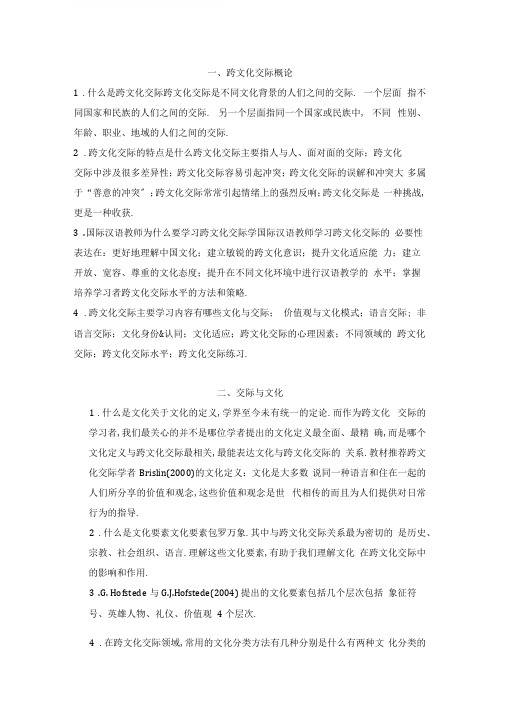
一、跨文化交际概论1.什么是跨文化交际跨文化交际是不同文化背景的人们之间的交际. 一个层面指不同国家和民族的人们之间的交际. 另一个层面指同一个国家或民族中, 不同性别、年龄、职业、地域的人们之间的交际.2.跨文化交际的特点是什么跨文化交际主要指人与人、面对面的交际;跨文化交际中涉及很多差异性;跨文化交际容易引起冲突;跨文化交际的误解和冲突大多属于“善意的冲突〞;跨文化交际常常引起情绪上的强烈反响;跨文化交际是一种挑战,更是一种收获.3.国际汉语教师为什么要学习跨文化交际学国际汉语教师学习跨文化交际的必要性表达在:更好地理解中国文化;建立敏锐的跨文化意识;提升文化适应能力;建立开放、宽容、尊重的文化态度;提升在不同文化环境中进行汉语教学的水平;掌握培养学习者跨文化交际水平的方法和策略.4.跨文化交际主要学习内容有哪些文化与交际;价值观与文化模式;语言交际; 非语言交际;文化身份&认同;文化适应;跨文化交际的心理因素;不同领域的跨文化交际;跨文化交际水平;跨文化交际练习.二、交际与文化1.什么是文化关于文化的定义,学界至今未有统一的定论.而作为跨文化交际的学习者,我们最关心的并不是哪位学者提出的文化定义最全面、最精确,而是哪个文化定义与跨文化交际最相关,最能表达文化与跨文化交际的关系.教材推荐跨文化交际学者Brislin(2000)的文化定义:文化是大多数说同一种语言和住在一起的人们所分享的价值和观念,这些价值和观念是世代相传的而且为人们提供对日常行为的指导.2.什么是文化要素文化要素包罗万象.其中与跨文化交际关系最为密切的是历史、宗教、社会组织、语言.理解这些文化要素,有助于我们理解文化在跨文化交际中的影响和作用.3.G. Hofstede与G.J.Hofstede(2004) 提出的文化要素包括几个层次包括象征符号、英雄人物、礼仪、价值观4个层次.4.在跨文化交际领域,常用的文化分类方法有几种分别是什么有两种文化分类的方法在跨文化交际领域最为常用.一种是客观文化与主观文化.另二种是主导文化与亚文化.5.文化有什么特点呢〔1〕文化是后天习得的.〔2〕文化是共享的,并世代相传.〔3〕大局部文化是无意识的.〔4〕文化是象征的.〔5〕文化是动态的.6.什么是交际与文化的定义相似,关于交际的定义也非常丰富和复杂.教材仅推荐与跨文化交际语用领域相关的定义.即Gudykunst& Kim〔2003〕提出的关于交际的定义:交际是编码和解码的过程,但是这种编码和解码的过程并非单纯的传递和接受过程,而是包含着意义的协商和共建.7.交际的要素是什么交际是互相交往的过程,交际的全部过程包含以下要素:传送者、信息、编码、解码、媒介、反响、噪音.8.交际有什么特点〔1〕交际是象征的〔2〕交际是动态的过程〔3〕交际涉及意义的协商和共建〔4〕交际发生在意识的各个层面.〔5〕交际是特定语境中发生的.9.文化对交际有什么影响文化从两个层面影响交际:一是从文化标准的层面,二是从个人层面.文化影响着人们的感知.首先, 文化影响人们对外部刺激的选择.其次,文化影响人们对外部刺激的分类.第三,文化影响人们对外部刺激的意义联想.最后,文化影响人们对外部刺激的解释.文化的特征值是它为行为提供指南.文化影响人们的饮食行为.文化还影响人们的衣着打扮.文化影响居住方式.文化影响人们的出行方式.文化也影响了人与人交往的方式.1.什么是价值观价值观不是实际的行为, 而是关于行为的规那么;价值观是一套关于什么是真善美的标准系统;这些规那么和标准是用来判断和指导人们的行为的;价值观不是个人的爱好或倾向,而是一种集体的文化意识.2.价值观如何分类一类是终极性价值观, 它是关于生命、生存等终极目标的价值观,另一类是工具性价值观,它是关于道德和水平的价值观.3.价值观有什么特点〔1〕价值观属于深层文化.〔2〕价值观是人们的行为指南. 〔3〕价值观既是稳定的,也是变化的.〔4〕不同文化的价值观既有相同的也有不同的成分.〔5〕价值观被违背时会引起情感上的强烈反响.4.关于价值观模式的研究具有影响力的理论是哪些1.价值取向理论〔由kluckhohn与Strodtbeck提出〕2.文化尺度〔由Hofstede提出〕3.高语境文化与低语境文化〔由Hall提出〕.5.中国文化模式有什么特点〔 1〕集体主义〔2〕以家庭为中央〔3〕尊重传统〔4〕等级观念〔5〕面子观念〔6〕重视人情6.美国文化模式有什么特点〔 1〕个体主义〔2〕平等观念〔3〕强调变化和进步〔4〕物质享受〔5〕科学与技术〔6〕工作与娱乐〔7〕竞争意识四、跨文化的语言交际1概念提要:1.萨丕尔-沃尔夫假说的含义萨丕尔-沃尔有三层含义.〔1〕不同的语言以不同的方式感知和划分世界.〔2〕一个人所使用的语言结构影响他感知和理解世界的方式.〔3〕讲不同语言的人感知世界是不同的.2.语言与价值观之间是什么关系语言与文化的关系最直接的表达是语言表达了人们对世界的看法、态度和价值取向.每种语言都拥有丰富的格言、警句和俗语.这些句子往往就是价值观的表达.3.词义与文化是什么关系在语言的各要素中,词汇与文化的关系最为密切,其对跨文化交际的影响也最为突出.语言的含义不具有普遍性,它受到文化和语境的制约.不同语言和文化的人们进行跨文化交际时,可能会由于对词语含义的误解而产生交流的障碍.4.什么叫委婉语学习它有什么意义禁忌是人类社会普遍存在的文化现象, 人们对诸如生老病死、隐私等许多方面多有避讳,因此产生了大量的委婉语. 了解不同文化中的禁忌和相应的委婉语不仅可以深入理解不同文化的价值取向,也可以防止在跨文化交际中出现不必要的误会.四、跨文化的语言交际2概念提要:1.礼貌原那么包括哪些准那么〔1〕得体准那么〔2〕慷慨准那么〔3〕赞扬准那么〔4〕谦虚准那么〔5〕一致准那么〔6〕同情准那么.2.中国人的礼貌特征包括哪些〔1〕贬己尊人〔2〕称呼准那么〔3〕文雅准那么〔4〕求同准那么〔5〕德、言、行准那么.3.礼貌策略的使用受到什么因素的制约〔1〕说话人与听话人之间的权力距离〔2〕说话人与听话人之间的社会距离〔3〕言语行为的强加程度4.什么是交际风格交际风格是指说话的特点.5.在跨文化交际领域中,常见的交际风格包括哪些〔1〕直接与间接的交际风格〔2〕谦虚与自信的交际风格〔3〕归纳与演绎的交际风格五、跨文化的非语言交际概念提要:1.什么是非言语交际非言语交际不包括语言,而是包括了各种非语言的交际行为;非语言交际具有互动性,涉及信息的发出者和接受者的编码和解码过程;非言语交际是在特定情境中产生的,与语境有密切关系;非语言交际可能是有意的,也可能是无意的.2.非语言交际的功能有哪些〔 1〕传达真实的内在感情〔2〕营造交际印象〔3〕进行会话治理3.非语言交际与语言交际是什么关系非语言交际对语言信息起着重复、补充、代替、标准和否认等作用.4.体态语包括哪些人们的外貌服饰、面部表情、眼神交流、手势、姿势以及身体接触都是体态语,都参与了交际,是非语言交际的一局部.5.时间观念与文化之间有什么联系时间观念是非语言交际的重要维度, 也是价值观的表达.6.什么是单时制文化其特点是什么单时制文化中的时间是线性的,可以向前延伸到未来,向后延伸到过去.单时制文化的人们通过方案和预约来限制时间,在一段时间内只做一件事,强调准时、预约和最后期限.7.什么是多时制文化其特点是什么多时制文化并不把时间看做是线性的.多时制文化中的人认为时间围绕着生活,在同一时间内可以做多件事情.工作常常被打断,方案也常改变.身处多时制文化中的人,维系人际关系和谐远比遵守时间重要.8.人们对于空间的利用与文化之间有什么联系空间利用也是非语言交际的重要内容.空间利用方式表达了特定文化中人际关系的特点.六、文化适应概念提要:1.文化适应策略有哪些同化、别离、融合以及边缘化.2.文化适应是一个复杂、动态的开展过程.短期旅居者的跨文化适应过程分为哪几个阶段蜜月期、挫折期、恢复期和适应期.3.焦虑处理理论认为什么因素影响跨文化适应个体性格因素、社会支持、性别、民族、处理文化适问题的策略等.4.什么是文化休克文化休克是一种因失去了熟悉的社会交往符号而产生的心理焦虑.5.应对文化休克可采取什么策略应对呢广交朋友,建立良好人际关系;学习目的国的语言;了解目的文化的知识;做自己感兴趣的事情;参加社会文化活动;改变自己的思维.6.什么是文化适应假说第二语言教学领域的学者很早注意到了文化适应与第二语言学习的关系.Schuman(1986跟出了文化适应假说〞.他认为, 学习者只有适应了第二文化以后才能习得第二语言,文化适应的程度决定第二语言学习的程度.7.Schuman(198觎出的社会距离的概念是什么社会距离指的是学习者的原有文化与目的语文化之间的差异程度.七、跨文化的人际交往概念提要:1.人际关系与文化的联系表达在哪几方面不同文化间的朋友关系、人情关系、工作关系、与陌生人之间的关系都受到文化的影响.2.交往习俗与文化之间有什么联系在社会交往中,人们需要遵循社交礼仪和规那么,而这些规那么会因文化而异.一种文化中得体、礼貌的规那么到了另一种文化中可能是不得体的,甚至还造成了冒犯.了解不同文化的社交习俗和礼仪,对提升跨文化交际的有效性和得体性是非常有必要的.3.公共礼仪与文化之间有什么联系遵守公共秩序和礼仪是现代人的基本素养,也是一个国家文明程度的表达. 在跨文化交往中,了解和遵守不同文化的公共礼仪非常重要.不遵守公共礼仪会给人留下负面的印象,甚至引起跨文化交往中的冲突.八、跨文化人际交际的心理与态度概念提要:1.什么是刻板印象刻板印象又作成见〞与谊型观念〞,是指一个群体成员特征的概括性看法.2.刻板印象有什么特点〔1〕刻板印象是人们正常思维的一局部.〔2〕刻板印象是文化的一局部.〔3〕刻板印象的最大局限是以偏概全,无视个体差异.3.如何克服刻板印象〔1〕意识到刻板印象的存在.〔2〕改变懒惰和简化的思维习惯.〔3〕扩大与不同文化的人的接触范围.〔4〕试图寻找充分的证据和例外的情况.〔5〕对于来自其他文化的个人的行为的描述,应采用表达性语言,而不是对这一文化群体进行评价和简单概括.4.什么是偏见偏见是对一个群体的成员建立在错误而僵化的概括根底上的负面感情5.如何克服偏见〔1〕坦诚面对自己的偏见.〔2〕扩大与不同文化的人的接触范围.〔3〕参加课程学习和培训.〔4〕在交际中防止使用带有偏见或歧视色彩的表达方式,特别是对弱势群体要注意使用委婉而礼貌的称呼.6.什么是种族中央种族中央指的是在思考和评价别的文化时,把自己的文化放在一切事物的中央位置,并且以自己文化的框架作为衡量的标准.7.什么是文化相对主义文化相对主义是与种族中央主义相对的概念.它最早由美国著名人类学家弗朗兹博厄斯所倡导.其包括两个方面的内容.第一, 每种文化都有自己长期形成的独特历史, 其形态并无上下之分;第二,任何一个民族都有自己的社会思想、世界观和道德观,人们不应该用自己的一套标准来衡量其它民族的文化.。
跨文化交际知识点整理
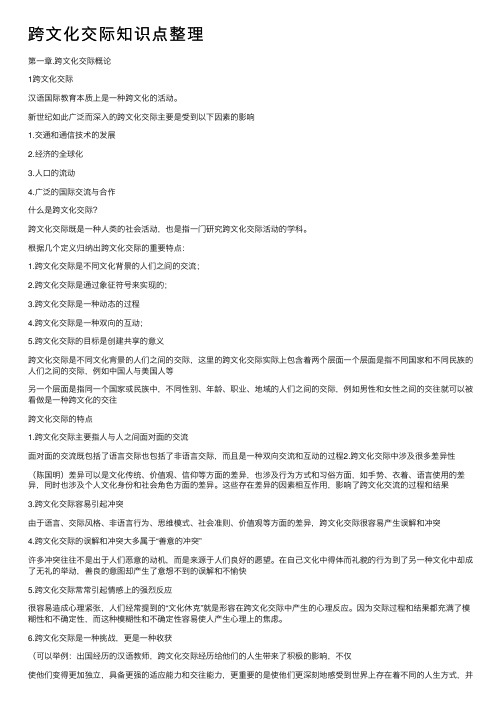
跨⽂化交际知识点整理第⼀章.跨⽂化交际概论1跨⽂化交际汉语国际教育本质上是⼀种跨⽂化的活动。
新世纪如此⼴泛⽽深⼊的跨⽂化交际主要是受到以下因素的影响1.交通和通信技术的发展2.经济的全球化3.⼈⼝的流动4.⼴泛的国际交流与合作什么是跨⽂化交际?跨⽂化交际既是⼀种⼈类的社会活动,也是指⼀门研究跨⽂化交际活动的学科。
根据⼏个定义归纳出跨⽂化交际的重要特点:1.跨⽂化交际是不同⽂化背景的⼈们之间的交流;2.跨⽂化交际是通过象征符号来实现的;3.跨⽂化交际是⼀种动态的过程4.跨⽂化交际是⼀种双向的互动;5.跨⽂化交际的⽬标是创建共享的意义跨⽂化交际是不同⽂化背景的⼈们之间的交际,这⾥的跨⽂化交际实际上包含着两个层⾯⼀个层⾯是指不同国家和不同民族的⼈们之间的交际,例如中国⼈与美国⼈等另⼀个层⾯是指同⼀个国家或民族中,不同性别、年龄、职业、地域的⼈们之间的交际,例如男性和⼥性之间的交往就可以被看做是⼀种跨⽂化的交往跨⽂化交际的特点1.跨⽂化交际主要指⼈与⼈之间⾯对⾯的交流⾯对⾯的交流既包括了语⾔交际也包括了⾮语⾔交际,⽽且是⼀种双向交流和互动的过程2.跨⽂化交际中涉及很多差异性(陈国明)差异可以是⽂化传统、价值观、信仰等⽅⾯的差异,也涉及⾏为⽅式和习俗⽅⾯,如⼿势、⾐着、语⾔使⽤的差异,同时也涉及个⼈⽂化⾝份和社会⾓⾊⽅⾯的差异。
这些存在差异的因素相互作⽤,影响了跨⽂化交流的过程和结果3.跨⽂化交际容易引起冲突由于语⾔、交际风格、⾮语⾔⾏为、思维模式、社会准则、价值观等⽅⾯的差异,跨⽂化交际很容易产⽣误解和冲突4.跨⽂化交际的误解和冲突⼤多属于“善意的冲突”许多冲突往往不是出于⼈们恶意的动机,⽽是来源于⼈们良好的愿望。
在⾃⼰⽂化中得体⽽礼貌的⾏为到了另⼀种⽂化中却成了⽆礼的举动,善良的意图却产⽣了意想不到的误解和不愉快5.跨⽂化交际常常引起情感上的强烈反应很容易造成⼼理紧张,⼈们经常提到的“⽂化休克”就是形容在跨⽂化交际中产⽣的⼼理反应。
跨文化交际学概论(重点知识点)

跨文化交际学概论第一章:两个重要概念:文化(culture),交际(communicate):1.不同的文化定义(涉及内容十分广泛,不同研究者有不同定义)广义文化:指人类社会实践过程中所获得的物质、精神的生产能力和创造的物质、精神财富的总和。
狭义文化:精神生产能力和精神产品,包括一切社会意识形式;自然科学、技术科学、社会意识形式。
英国人类学家泰勒1871年在《原始文化》中提到的定义影响很大。
综上:是人类社会创造的财富,包括食物、器具,也包括信念、价值观、习俗、知识。
可分为物质文化、制度文化和观念文化。
特性:人类独有;来自后天习得;大部分存在于人的潜意识;是行动的指南;动态,与一定历史时期相联系。
2.交际与传播交际就是人与人之间的往来交际活动。
交际就是传播,主要指人际间进行的直接或间接的信息交流和沟通和沟通活动3.传播与跨文化交际传播:普通的存在的现象;动态行为;信息的流动过程。
含义:人们应用符号并借助媒介交流信息的行为与过程;人与人之间直接交往活动;通过媒介进行的信息交流与沟通活动。
人类传播的发展:信息符号传播:有限的声音、体语符号、其它符号、实物口语传播:口语产生后进行的传播活动;新闻、历史、文学、传说、神话等混在一起文学传播:象形文字【古埃及纸草文字、古印度印章文字、苏美尔人楔形文字、中国甲骨文】媒介传播:印刷媒介【报纸、杂志、书籍】,电子媒介【广播、电视】,网络媒介【网络、数字化】传播类型:非人类传播与人类传播【人内传播、人际传播、组织传播、大众传播】传播模式:是对客观事物的内外部机制的直观而简洁的描述。
理论的简化形式,可以向人们提供客观事物的整体信息传播中的障碍:主要来自社会系统,即不同文化传统和背景导致的传播沟通障碍。
有语言障碍、非语言障碍、心理障碍、理念障碍跨文化交际伴随人类产生发生出现;不同民族相互接触与融洽的结果;交通和通讯工具的发展促进跨文化交际的发展含义:具有不同文化背景的人们之间进行的交际往来或信息传播与沟通活动范围:除国别文化研究外,还应对地区、阶层、职业、年龄、性别等方面的文化差异进行研究和探讨研究层面:不同民族、国家主流文化间的跨文化交际;亚文化间的跨文化交际;地区文化间的跨文化交际;小群体文化的跨文化交际文化在跨文化交际中的地位:是跨文化交际的核心;文化的复杂性影响跨文化研究;文化涵盖历史与现实、实物与制度及观念、稳定性与能动性、群体特点与地区及个体差异影响跨文化交际的主要因素:民族的历史与传统、宗教思想、价值观念、社会组织形式、风俗习惯、政治制度、社会发展阶段第二章:文化感知与价值观一、文化感知感知1、感觉:感官对刺激对象个别属性的直接反映,最简单的心理过程2、知觉:根据感觉所获信息作出的心理反应。
《跨文化交际》主要内容梳理.ppt

《跨文化交际》主要内容梳理
第二讲 语言中的文化差异1
Ⅰ.Cultural Connotations of Words:
A.Image and culture 形象与文化
狗:dog E-neutral word
C-(with derogatory sense)如:
走狗/看家狗/赖皮狗/痛打落水狗/狗东西
《跨文化交际》主要内容梳理
第一 日常谈话中的文化差异2
To American the greeting might mean this:“I
haven’t either. Come on, let’s go together and get something to eat,” or “if you haven’t,I was just going to invite you to my place.” In other words, it could indicate an invitation to a meal. When Chinese part, they usually say good-bye, bye-bye. But usually in China, it’s a custom to say请留步,慢走,走好,慢点 骑等等。
《跨文化交际》主要内容梳理
《跨文化交际》主要内容梳理
第一讲 日常谈话中的文化差异1
A.Greetings and Farewells
Westerners coming to China always feel surprised
to be told that the Chinese people often greet people with 你吃饭了没有?This, of course, is a common Chinese greeting around meal time and the people merely nodded with a smile, waved goodbye and went off. As we all realise that this remark was nothing more than a Chinese way of saying Hello or Hi. If the greeting had been put literally into English Have you eaten yet? Or Have you had your lunch? It would have sounded rather unusual.
跨文化交际重点梳理

跨文化交际重点梳理跨文化交际是指在不同文化背景下进行交流和互动。
在一个全球化的世界中,跨文化交际变得越来越重要。
跨文化交际的目标是建立和维持不同文化之间的理解和合作关系。
然而,由于不同文化之间的差异,跨文化交际面临着许多挑战。
本文将重点梳理跨文化交际的关键点。
第一点是尊重和理解。
在跨文化交际中,尊重对方的文化背景和价值观是非常重要的。
了解对方的文化习俗和礼仪,避免不必要的冒犯。
同时,要有开放的心态去接纳和理解不同文化之间的差异,避免以自己的文化标准来评判对方。
第二点是语言和沟通。
语言是跨文化交际中最基本的工具。
如果能够掌握对方的语言,会更容易建立起良好的沟通。
即使不懂对方的语言,也可以通过非语言交流来进行沟通,比如表情、手势等。
在沟通中,要注意言辞的选择和表达方式,避免使用可能引起误解或冲突的词语和表达方式。
第三点是文化差异的认知和适应。
不同文化之间存在许多差异,包括价值观、信仰、习俗等。
了解这些差异并适应它们是跨文化交际的关键。
要学会尊重和接受不同文化的观点,不以自己的文化为标准去评判对方。
同时,要学会调整自己的行为和态度,以适应不同文化的环境和习俗。
第四点是文化敏感性和适应能力。
在跨文化交际中,对不同文化之间的差异有敏感性是非常重要的。
要善于观察和理解对方的行为和表达方式,避免陷入误解和冲突。
此外,要学会调整自己的行为和表达方式,以适应对方的文化习俗和社交规则。
第五点是跨文化交际的意识和知识。
了解不同文化的历史、政治、经济等方面的知识是非常有帮助的。
这些知识能够帮助理解对方的思维方式和价值观,并帮助建立起更深入的交流和合作关系。
同时,要保持对不同文化的持续学习和探索的意识,以不断提升自己的跨文化交际能力。
综上所述,跨文化交际是一项复杂而重要的能力。
尊重和理解、语言和沟通、文化差异的认知和适应、文化敏感性和适应能力,以及跨文化交际的意识和知识,是跨文化交际的关键点。
通过不断学习和实践,我们可以提升自己的跨文化交际能力,建立起更加和谐和有效的跨文化关系。
《跨文化交际》主要内容梳理.共28页文档

1、合法而稳定的权力在使用得当时很 少遇到 抵抗。 ——塞 ·约翰 逊 2、权力会使人渐渐失去温厚善良的美 德。— —伯克
3、最大限度地行使权力总是令人反感 ;权力 不易确 定之处 始终存 在着危 险。— —塞·约翰逊 4、权力会奴化一切。——塔西佗
5、虽然权力是一头固执的熊,可是金 子可以 拉着它 的鼻子 走。— —莎士 比
ቤተ መጻሕፍቲ ባይዱ
1、最灵繁的人也看不见自己的背脊。——非洲 2、最困难的事情就是认识自己。——希腊 3、有勇气承担命运这才是英雄好汉。——黑塞 4、与肝胆人共事,无字句处读书。——周恩来 5、阅读使人充实,会谈使人敏捷,写作使人精确。——培根
跨文化交际重点

跨文化交际核心典型负语言高语境(汉语)和低语境(英语等其他语言)对语言环境依赖性强跨文化交际重要性跨文化意义什么是跨文化交际:具有不同文化背景的人从事交际的过程就是跨文化交际。
LSHarms认为世界范围内的交际经历了五个阶段:语言的产生,文字的使用,印刷术的发明,近百年来交通工具的进步和通讯手段的迅速发展,跨文化交际。
他认为,本阶段的交际以跨文化交际为主要特征,是第五个阶段,其重要性堪比语言的产生。
什么是主流文化:什么是亚文化:跨文化交际研究中应该把眼光首先集中于国别研究,集中于一个国家中的主流文化研究。
跨文化交际学首先在美国兴起,其原因有:一、美国是一个移民国家;二、各民族争取权力的斗争,是美国形成了多元文化的格局;三、美国与各国频繁交往,国际交流密集,对大批留学生和移民的训练也是跨文化交际中的一个重要课题。
跨文化交际发展:《无声的语言》Edward Hall,1959,被看作是跨文化交际学的奠基之作。
1970,国际传播学会承认跨文化交际学是传播学的一个分支,具有重要的学术领域意义。
随后大学中纷纷开设此系。
1972,第一届跨文化交际学会国际会议在日本东京举行。
1974,跨文化教育训练和研究学会在美国马里兰州召开首届会议,宣布成立,这是跨文化交际学方面最具影响力的一个组织。
70年代中期,美国已近更有两百多所大学开设跨文化交际课程,并设有硕士和博士学位。
跨文化交际的内容:语言交际,非语言交际,社会行为准则,社会关系,思想观念(人生观价值观),心理因素。
文化的特性:文化是人类独有的,是区别人类和动物的主要标志,文化是社会遗产而不是生理遗传。
文化不是先天所有,而是后天习得。
一个人具有什么文化不取决于他的种族,而取决于他生活的文化环境文化中的大部分是不自觉的,存在于人的潜意识中文化是人们行动的指南,支配着人的行动文化是动态的,文化的形态与一定的历史时期相联系,具有相对的稳定性,但是随历史时期不断变化。
传播的种类:人类传播和非人类传播;人类传播中又有社会传播和非社会传播,非社会传播指向内传播(自我传播),社会传播包括人际传播、组织传播与大众传播。
跨文化交际知识点汇总

跨文化交际知识点汇总随着全球化的不断发展,越来越多的人涉及到跨文化交际。
在跨文化交际中,人们需要面对不同的文化背景、价值观、信仰等等。
因此,了解跨文化交际的知识点是非常必要的。
本文将为您汇总一些常见的跨文化交际知识点,帮助您更好地应对跨文化交际。
1. 礼仪与期望礼仪是跨文化交际中十分重要的一个方面。
不同的文化有不同的礼仪,了解对方的礼仪可以避免不必要的误解。
例如,在中国,对于长辈、上司以及客人,应该尽量保持谦和的态度,不要直接表达自己的意见。
而在美国,直接表达自己的意见是很受欢迎的,而且应该尽量避免谈论政治、宗教等敏感话题。
除了礼仪,期望也是跨文化交际中需要了解的方面之一。
不同的文化对于个人行为、团体关系、家庭结构等都有不同的期望。
例如,在日本,人们非常注重团队合作,而在美国,个人表现非常重要。
理解对方的期望可以帮助你更好地沟通和交往。
2. 文化差异文化差异是跨文化交际中最主要的问题之一。
不同的文化有不同的价值观、信仰、传统和历史,这些都会影响到人们的言行举止。
了解对方的文化背景、价值观等可以帮助你更好地理解对方的意图和行为。
例如,在西方文化中,女性独立自主被看作是一种积极的价值观。
而在一些传统文化中,女性被期望在家庭中负责家务和照顾子女。
这种文化差异如果不加以理解,可能会导致沟通上的不顺畅。
3. 语言障碍语言障碍是跨文化交际中非常常见的问题。
不同的语言有不同的表达方式、语法、单词等等。
即使使用相同的语言,不同国家或地区也有不同的方言和口音。
因此,在进行跨文化交际时,理解对方的语言是非常重要的。
如果你不太熟悉对方使用的语言,可以通过翻译或使用翻译应用来帮助你更好地理解对方的意图。
4. 非语言交流方式非语言交流方式也是跨文化交际中需要重视的方面。
非语言交流方式包括眼神、姿势、面部表情等等。
在某些文化中,微笑是一种表示友好的方式,而在其他一些文化中,微笑可能被解读为不敬或者虚伪。
因此,在进行跨文化交际时,需要学会解读对方的非语言交流方式。
跨文化交际学知识点
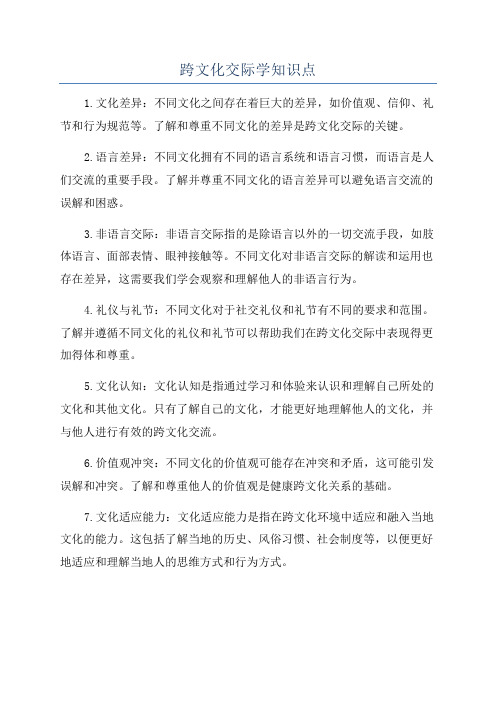
跨文化交际学知识点1.文化差异:不同文化之间存在着巨大的差异,如价值观、信仰、礼节和行为规范等。
了解和尊重不同文化的差异是跨文化交际的关键。
2.语言差异:不同文化拥有不同的语言系统和语言习惯,而语言是人们交流的重要手段。
了解并尊重不同文化的语言差异可以避免语言交流的误解和困惑。
3.非语言交际:非语言交际指的是除语言以外的一切交流手段,如肢体语言、面部表情、眼神接触等。
不同文化对非语言交际的解读和运用也存在差异,这需要我们学会观察和理解他人的非语言行为。
4.礼仪与礼节:不同文化对于社交礼仪和礼节有不同的要求和范围。
了解并遵循不同文化的礼仪和礼节可以帮助我们在跨文化交际中表现得更加得体和尊重。
5.文化认知:文化认知是指通过学习和体验来认识和理解自己所处的文化和其他文化。
只有了解自己的文化,才能更好地理解他人的文化,并与他人进行有效的跨文化交流。
6.价值观冲突:不同文化的价值观可能存在冲突和矛盾,这可能引发误解和冲突。
了解和尊重他人的价值观是健康跨文化关系的基础。
7.文化适应能力:文化适应能力是指在跨文化环境中适应和融入当地文化的能力。
这包括了解当地的历史、风俗习惯、社会制度等,以便更好地适应和理解当地人的思维方式和行为方式。
8.文化敏感度:文化敏感度是指对他人文化背景和差异的敏锐和尊重。
具备文化敏感度可以使我们更好地倾听和理解他人,并能够避免跨文化交流中的误解和歧视。
9.文化智商:文化智商是指在跨文化交际中应对挑战和解决问题的能力。
具备文化智商可以帮助我们处理跨文化交际中的困难和冲突,并能够建立有效的合作和关系。
10.跨文化沟通技巧:跨文化交际需要一定的沟通技巧,如倾听、提问、反馈和整合信息等。
掌握跨文化沟通技巧可以帮助我们更好地与他人交流和理解,以达到共同的目标。
总之,跨文化交际学的知识点涵盖了文化差异、语言差异、非语言交际、礼仪与礼节、文化认知、文化适应能力、文化敏感度、文化智商等方面。
掌握这些知识点可以帮助我们在跨文化交际中更好地理解他人,避免误解和冲突,建立良好的跨文化关系。
跨文化交际重点归纳
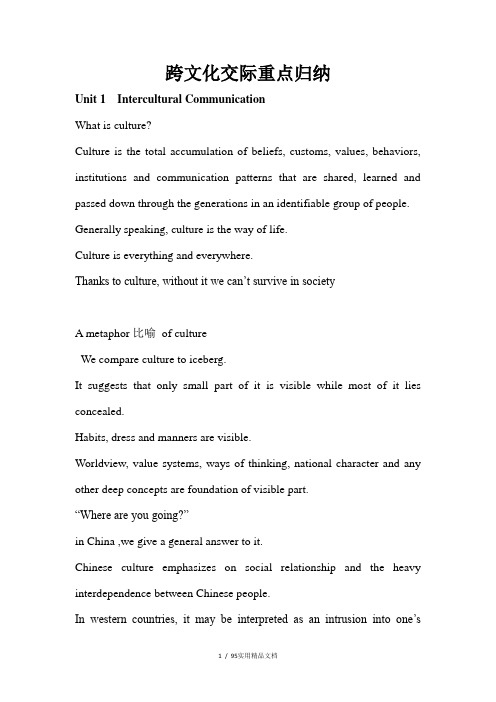
跨文化交际重点归纳Unit 1 Intercultural CommunicationWhat is culture?Culture is the total accumulation of beliefs, customs, values, behaviors, institutions and communication patterns that are shared, learned and passed down through the generations in an identifiable group of people. Generally speaking, culture is the way of life.Culture is everything and everywhere.Thanks to culture, without it we can’t survive in societyA metaphor比喻of cultureWe compare culture to iceberg.It suggests that only small part of it is visible while most of it lies concealed.Habits, dress and manners are visible.Worldview, value systems, ways of thinking, national character and any other deep concepts are foundation of visible part.“Where are you going?”in China ,we give a general answer to it.Chinese culture emphasizes on social relationship and the heavy interdependence between Chinese people.In western countries, it may be interpreted as an intrusion into one’sprivacy.The underlying individual-oriented relationship is the invisible part of the iceberg.exercise1. If you are a tourist guide, what are you expected to say when you are showing the foreign visitors to another site?A. This way, please.B. Come here, please.C. Follow me, please.D. Move on.2. A visitor stops you in the corridor of your head-office probably to ask for the way. What is your most likely reply to the visitor’s “Excuse me”?A. What’s the matter?B. Yes?C. That’s all right.D. Don’t worry.3. At a fair, a visitor, accidentally having knocked down your poster, says, “I’m terribly sorry.” What should you reply?A. It doesn’t matter.B. Never mind.C. Don’t worry.D. That’s all right.What is Intercultural communication?“Intercultural communication is contact between persons who identify themselves as distinct from one another in cultural terms.” (Collier & Thomas, 1998)intercultural communication refers to any communication between two members of any cultural communities. (Samovar & Porter)To further understand “intercultural communication”, please read the section of “Intercultural Communication Reading” on P.2 and answer the questions:1 In the story, why does Pete could not communicate well with Chinese students?Language problemCulture problemThe way Pete handled the intercultural communication situation2 What are the major barriers in intercultural communication? Language difference.(If we understand others’ language or dialect, but not their communication rules, we can made fluent fools of ourselves.) Nonverbal communication: gestures, postures, facial expression etc. Stereotypes: like culture, religion, idea, value, etc.Watch a video and get a deeper understanding.Classifications of Communicationverbal /nonverbalDirect /indirectInterpersonal / interorganizational / mass media-basedIntracultural /interculturalIntrapersonal / interpersonal/…Case studyRead the passage of “ an Intercultural Classroom”. This is the beginning of this passage:It was a hot day. Since it was still too early to use the air-conditioner, according to the regulations of the university, every class kept its door open to make the classroom cooler. While I was lecturing on Chinese grammar in Class 4, waves of laughter came from the neighboring Class 5. A German student named Stephen raised his hand and stood up. “The laughter from Class 5 is bothering us. I think we should go to their class to protest,” he said….1 How many different solutions did Class 4 propose?2 what is the mode of communication favored by Asians? What cultural values underlie it?Asian people are very courteous and indirect in their communications. They put great emphasis on group harmony, they are very tolerant, even when they are offended. These collectivistic values, shaped by Confusion teachings, were spread from China to many Asian countries.3 what is the mode of communication favored by Westerners? What cultural values underlie it?Westerners are generally very direct and frank in their mode ofcommunication. And they have a strong sense of protecting their own rights. Individualistic values are the underlying principles governing their behavior.Classroom activity 11. Read the story on P1 and answer: Why do you think the driver is asking for $50 instead of $32.5?2. Work in groups and write down 5 ways to deal with the situation. Some likely interpretationsThe taxi driver is trying to cheat Lee.extra charges for luggage that Lee doesn’t know about.Extra charges for tolls that Lee doesn’t know.There is an honest misunderstanding.L ee misunderstood what the driver said, or didn’t hear what he said clearly.The driver has included a tip for himself –an unreasonably large one. Culture NoteTaxi charges: in taxis in the us, it is quite normal to have a small extra charge for each of luggage. In the us there are also sometimes tolls for bridges, tunnels and certain roads. and the taxi driver will pay these first and then add them to the cost of the ride.Tipping: in the us it is normal to add a tip of 10%-15% to the cost of a taxi ride. (tipping is not normal in fast-food restaurants where customs gettheir own food.Taxis in the Us: while taxis can often be found at Us airports, taxis are rare in all but the largest American cities, and to get a taxi people often need to call a taxi company. This is because most Americans drive their cars. (in large cities, taxi drivers are often immigrants form other countries who do not speak English as their first language.)Classroom activity 2Read Letter to Fran: Not Eating and answer the following questions.1. Why did Nancy eat so little?2. Tell the possible reasons for Nancy’s problem.Possible reasonsOn the whole, American cooking tends to be somewhat more bland than the cooking in most parts of China.Some westerners have allergic reactions to MSG(often used in Chinese cooking) and get headaches if they eat food containing it.Some Christians won’t drink alcoholic beverages.Read Fran’s Response: Not Eating after class and get more information. Discuss the differences of table manners between Chinese and Westerners.Chinese people often use words like color 、smell 、taste、shape to describe the food.Westerners usually pay more attention to the calories、vitamins、proteinsand so on.we would invite many people “the more the better”If the host respect you ,he will give you a seat at first and sit on the left chair .The host will prepare all the things ready. The host will get delicious food into the guest’s bowl .Westerners would like to keep quiet. They regard the right as a symbol of respect.The host will let the guests choose what to eat or drink.Individualist and CollectivistWhat are the characteristics of Individualist and Collectivist? Classroom activity 3Read the passage Individualist and Collectivist Cultures and finish the following tasks.What are some differences between an individualist culture and a collectivist one?find out ways of how do Chinese show individualism and how do westerners show their collectivism. You may need to supply your points with examples.Assignment:Review unit 1 and Preview unit 2Work in teams of 6 and deliver a presentation on following topics:What are differences between an individualist culture and a collectivistone?find out ways of how do Chinese show individualism and how do westerners show their collectivism. You may need to supply your points with examples.Unit 2Review: Interpretation解释、翻译of greetings上哪去?Where are you going?It’s none of your business!去哪啦?Where have you been?吃过了吗?Have you had your meal?Are you going to invite me to dinner?Acceptable Greetings中文出去呀?吃饭去?回来了?忙着呢?忙什么呢?在洗车呀?这衣服真漂亮,新买的吧?你看起来气色不错。
英语跨文化交际知识点归纳

“跨文化交际”知识点归纳
跨文化交际是指在不同文化背景下进行沟通和交流的过程。
以下是一些跨文化交际的知识点归纳:
文化意识:了解并尊重不同文化的差异,包括价值观、信仰、习俗、礼仪等。
意识到自己的文化背景对交际的影响,以及可能存在的误解和偏见。
礼仪与行为准则:了解并尊重不同文化的礼仪和行为准则,包括身体语言、礼节、用语等。
避免冒犯他人或引起误解。
语言交流:了解不同语言之间的差异和障碍,包括语音、语法、词汇和语境。
避免使用难以理解或具有歧义的语言表达。
价值观与信仰:了解并尊重不同文化对于价值观和信仰的重视。
避免对他人的信仰和价值观进行歧视或贬低。
时间观念:了解不同文化对时间的看法和处理方式。
有些文化注重准时,有些文化更加灵活。
尊重对方的时间观念,避免迟到或过早离开。
社交礼节:了解不同文化的社交礼仪和规范,包括问候、交谈、礼物赠送等。
避免冒犯他人或造成尴尬。
跨文化沟通技巧:学会倾听和观察,尊重对方的观点和意见。
避免偏见和刻板印象,尽量以开放和包容的心态进行交流。
文化敏感性:培养对不同文化的敏感性和包容心态。
尊重他人的文化背景,尽量避免对他人的文化进行评判或批判。
跨文化冲突解决:学会处理跨文化冲突和误解,以合作和妥协的方式解决问题。
避免以自己的文化标准来评判他人。
学习和适应能力:持续学习和适应不同文化的能力,包括语言、习俗、价值观等。
发展开放的心态和灵活的思维方式。
这些知识点可以帮助人们更好地理解和应对跨文化交际中的挑战,促进文化之间的理解和和谐。
《跨文化交际》主要内容梳理

《跨文化交际》主要内容梳理
第四 颜色词2
White
白色所引起的联想有一些是相似的。 Purity洁白,纯洁,innocence清白无辜 在汉译英时,应注意有“白”字的词语。 如;
白菜Chinese cabbage白熊polar bear
白费in vain
白开水boiled water
《跨文化交际》主要内容梳理
《跨文化交际》主要内容梳理
第二 语言中的文化差异5
Ⅱ.Unique Things of a Certain Culture某种文化所特有 的东西
街道妇女street women 个体户individual household 全民所有owned by the whole people
《跨文化交际》主要内容梳理
《跨文化交际》主要内容梳理
第五讲 禁忌与委婉语1
Taboos
《跨文化交际》主要内容梳理
第五 禁忌与婉语2
In different cultures, some words or expressions are to be avoided. There are verbal taboos. Peoples of different cultures do not all agree on what are taboos. English and Chinese have certain areas of agreement on taboos.
B.Ways of Address
《跨文化交际》主要内容梳理
第一 日常谈话中的文化差异3
In recent years, the trend of many Englishspeaking people has been to address others by using the first name tom, Michael, Linda, Jane, etc. Rather than calling the person Mr. Summers, Mrs. Howard or miss Jones.
跨文化交际重点

1.跨文化交际是指具有不同文化背景的人从事交际的过程。
这是自古以来就存在的普遍现象。
2.跨文化交际学首先在美国兴起。
3.1959年Edward Hall出版的《无声的语言》看作是跨文交际学的奠基之作。
4.跨文化交际中主要的问题或困难有六个方面:语言、非语言交际、社会行为准则、家庭和同事的关系、做事的动力和动机、思想观念。
5.克拉克洪对文化的定义:所谓文化指的是历史上创造出来的所有的生活样式,包括显型的和隐型的,包括合理的、不合理的以及谈不上是合理的或不合理的一切,它们在某一时期作为人们行为的潜在指南而存在。
6.价值观念是文化的核心,可以根据不同的价值观念区分不同的文化。
7.文化的特性:(1)文化是人类所独有的,是区别人类和动物的主要标志,.文化是社会的遗产而不是生理的遗传。
(2)文化不是先天所有,而是通过后天习得的。
(3)文化中的大部分是不自觉地。
(4)文化是人们行动的指南。
(5)文化是动态的,文化的形态与一定的历史时期相联系。
8.传播的模式:5W模式、线性模式和循环式的模式。
9.语言既是文化的载体又是文化的写照。
10.萨皮尔沃尔夫假说:他们认为语言不仅反映文化的形态,而且语言结构部分地或全部地决定人们对于世界的看法。
11.在英语中说一个人有点像dragon是说此人飞扬跋扈令人讨厌。
12.Waterloo是比利时的一个地名。
13.Catch-22意思是进退维谷,左右为难。
14.语用规则(讲话规则)包括如何称呼对方,如何见面打招呼,如何提出一项要求,如何接受或拒绝对方的要求,如何告别,讲话谁先谁后,讲话量谁多谁少等。
15.正式邀请比客气话要具体的多,一般来说邀请要包括时间、地点。
16.非语言交际包括眼神、手势、身势、微笑、面部表情、服装打扮、沉默、身体的接触、讲话人之间的距离、讲话的音量、时间观念、对空间的使用。
17.Let’s keep our fingers crossed.表示希望事情能够成功。
- 1、下载文档前请自行甄别文档内容的完整性,平台不提供额外的编辑、内容补充、找答案等附加服务。
- 2、"仅部分预览"的文档,不可在线预览部分如存在完整性等问题,可反馈申请退款(可完整预览的文档不适用该条件!)。
- 3、如文档侵犯您的权益,请联系客服反馈,我们会尽快为您处理(人工客服工作时间:9:00-18:30)。
`重点1Definition of cultureCulture is the total accumulation of beliefs, customs, values, institutions and communication patterns that are shared, learned and passed through the generations in an identifiable group of people.重点2Characteristics of culture(10)1、Culture is sharedCulture is a system of shared values beliefs or patterns of behaviors held in a group ,organization or society.It is not property of any individual.2、culture is cumulativeHuman beliefs, arts etc. are results of many generations.Every generations can discover the new things.The new knowledge are added to what was learned in previous generations.3、culture is learnedCulture is not inherent with any people.Culture can not be genetically and automatically passed down文档Word`from previous generations.And it should be taught and learned by people.4、culture is adaptiveCulture is created by humans. Humans have to adapt the environment . thus is in development bears the trait of being adaptive 5、culture is dynamicAt the same time that new culture are added, and the old ones are lost because they are no longer useful.6、culture is symbolicSymbols generally serve as communicative tools for a multitude purposes, on a persons as well as culture level.7 、culture is relationalCulture is an organic whole. All the components of culture are interlinked.8 、culture is implicit and explicitSome layers culture are easy to be observe, like eating , dressing, talking. But the ideas underlying the behaviors are generally hard to know. Many scholars label the culture as iceberg.文档Word`culture is universal 9、culture is diversified、10Hall's dimensions3重点High contextHigh-context communication relies heavily on nonverbal, contextual and shared cultural meanings.The meanings are not fully expressed.re determined by “how”things are said , rather than “what”Meanings ais said.阿拉伯欧洲东部和南部日本CollectivismLow contextVerbal codes rather than the information impliesClear straight and to-the-point communication美国德国斯堪的纳维亚IndividualismMonochromic cultureDo one thing at one time, Concentrate on the job, take time seriously, 文档Word`low-context and need information, commit to the job, religiously to the plans, not disturbing others, seldom borrow or lend things, emphasize promptnessPolychromic cultureDo many things at once, subject to interruptions, consider timecommitments an objective to be achieved, high-context and already haveinformation. Change plans often. Emphasize the relationships.重点4Triandis's individualism & collectivismIndividualismFosters independence and individual achievement,Promotes self-expression ,personal choice, individual thinking Associated with egalitarian relationships and flexibility in roles Understand the physical world as knowable apart of human life CollectivismInterdependence and group successPromotes adherence to normsAssociated with stable, hierarchical rolesShared property, group ownership文档Word`重点5Elements of communication Source (sender)EncodingMessageMedium(channel)ReceiverDecodingResponseFeedback重点6Grice's cooperative principle Quantity maximMake your contribute as informative as is required for the current purpose of exchange.Do not make your contribution more information than is required. (量的准则——话语提供充分而不多余的信息)Quality maximMake your contribution is ture(质的准则——话语的容是真实的)文档Word`Relation maximBe relevant(关系准则——话语与话题有关,即与所要实现的意图有关)Manner maximBe perspicuousAvoid obscurity of expressionAvoid ambiguityDe brief and orderly(方式准则——说话要清楚明白、简洁而有条理)重点7Brown & levinson's face theory Face is something that is emotionally invested, can be lost, maintained, or enhanced, and must be often attended to in communication People cooperate while maintaining face in interaction.Face theory : face threatening acts (FTAs)Politeness strategiesPoliteness strategies: bald on-record赤裸裸的公开实行面子威胁行为不使用补救措施off-record indirect strategy 非公开的实行面子威胁行为negative politeness消极礼貌策略Positive politeness积极礼貌策略文档Word`Face: negative facePositive face重点8Thought patternsField dependence场依存性Holistic thinking eastern peoplePerspective of the whole, all the relevant parts take into account.Easily influence by othersField independence场独立性Analytic thinking western peopleDivinding the whole into parts to analyze the features or relations between the partsHardly influence by othersEastern: field-dependence, holistic thinking, high-context Western: field-independence, analytic thinking, low-context文档Word`重点9Phases of negotiation Preparation 准备Non-task sounding 非任务测探Task-oriented exchangePersuasion 劝说ConcessionConclusion重点10Components of a brandBrand name 品牌名称(产品)Brand mark 品牌标志(产品)Trade name商号(公司名字)Trade mark 品牌商标重点11SWOT analysisStrengthsWeaknessesOpportunitiesThreats文档Word`重点12Intercultural advertising strategies Standardization strategyConvey and extend the same advertising message to different markets and culturesKey point:Deal with the different markets using the same massageExample:MarlboroPhilips优点:reinforce the corporate imageSaving energyBe convenient to manage compared with several ads缺点: unlikely to be adaptive without change to all foreign culture Result in misunderstanding or conflict even ruin a business Localization strategyStresses the specialties of the local market and adaptation to the local market environment文档Word`重点13Three meaning layers of adsthe surface meaningthe intended meaningthe cultural meaning文档Word。
